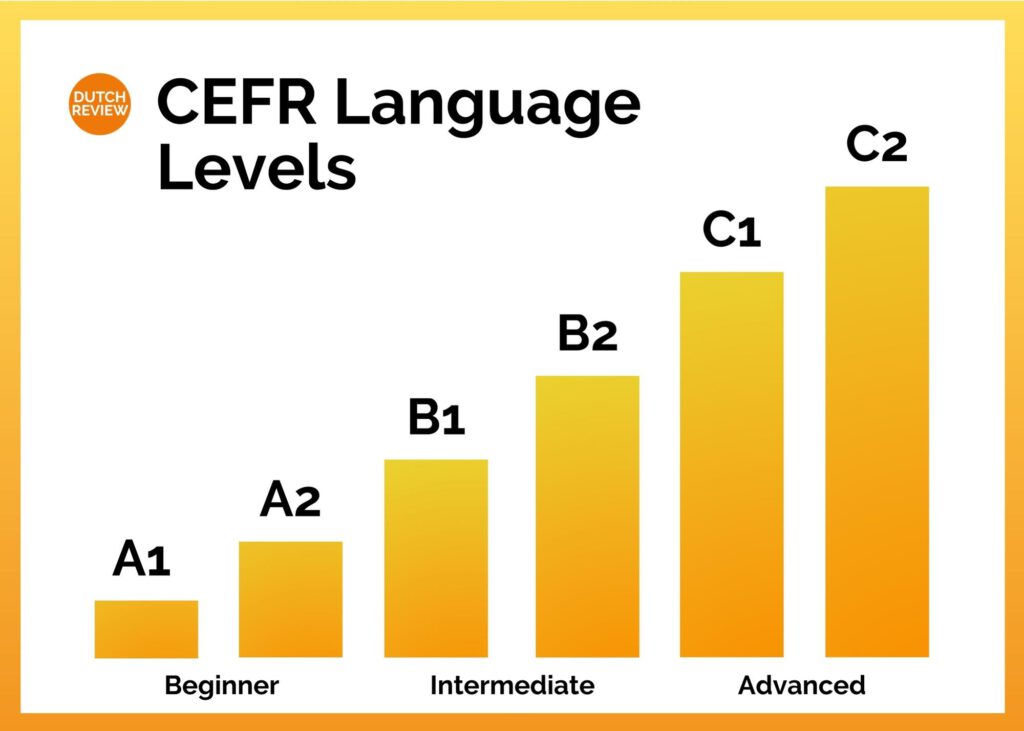It’s a question we’ve all asked ourselves before embarking on the journey to learn a new language — how long will it take to be able to converse, make jokes, or achieve ultimate fluency?
Of course, everyone’s individual situation is different, but there are some things we can all do to help speed up the process of learning Dutch.
How long it takes to learn Dutch
Dutch is a tricky language, there’s no denying it. How long it takes to acquire an understanding of the language and its various “ghhhuuhhs,” “aaauuus” and dreaded “ui” sounds all depends on you.
For example, what was your first language? And how’s your patience? Are you willing to mess up?

You can spend years learning a language and still find words that you haven’t come across before. But as a general guide, the Foreign Service Insitute in the US estimates it takes about 600 hours of class lessons (or 24 weeks) for a native English speaker to become fluent in Dutch.
Of course, very few of us have the opportunity to study Dutch for 25 hours every week. So to put those numbers into perspective, that would equal:
- 11.5 hours of class lessons every week for one year.
- 5.5 hours of class lessons every week for two years.
But remember fluency is just one goal. In Dutch, using the CEFR:
- you can hold a basic conversation at an A2 level,
- you can voice your own opinion and describe experiences, events, dreams and expectations at B1 level
- and you have an advanced level of Dutch that is generally considered good enough for the workplace at C1 level.
Want to experience the thrill of speaking Dutch? Taalthuis offers self-study, online, and in-person classes, so you can find a Dutch course that suits you. As alumni of the school ourselves, we can’t recommend them enough. Find out more.

The key to gaining understanding is to be patient with yourself, pick up word after word, and gradually you’ll have enough to string a few sentences together.
Then take those sentences and fit them together as clumsily as you can and ta-da! You’re on your way to speaking some imperfect Dutch — which is far better than none at all.
Good to know: it generally takes between 100 and 200 hours to progress through CEFR levels for Dutch.
Moral of the story, take the blow to your ego and talk like a three-year-old for a bit. Are you willing to make that sacrifice? Then great! You’re already ahead of some.
READ MORE | 11 myths about taking Dutch lessons, busted
Taking professional Dutch lessons
Naturally, you may find that you want to dedicate a bit more time to your Dutch and take advantage of some professional guidance. Lucky for you, that’s easy!

Part-time Dutch language courses
One sure way to help develop Dutch slowly over time, however, is to take part-time Dutch lessons. You can do this with a school or you can see if your local library might have something available.
Looking for an affordable part-time option? Taalthuis offer both in-person and online class times that are perfect for students and full-time workers alike. They can also take you from A1 all the way up to C2, no hopping around between schools. 💪
Classes like these are a great option for those who want to gradually nourish their Dutch language skills whilst working or studying full-time.
Take intensive Dutch lessons
However, every once in a while, the opportunity to focus more intensely on your language skills presents itself.
Perhaps you may find yourself in an “in-between” period in your life — you’ve finished your degree and are now looking for work, or you’ve just moved to the Netherlands and are getting settled in.

While it’s tempting to spend this time on some much-needed rest and relaxation, this is actually the perfect time to gain a new language skill by embarking on an intensive Dutch language course! (If not now, when?)
READ MORE | I tried Taalthuis’s online Dutch course; here’s why I’ll be returning
Language schools often offer intensive courses for those who are looking to learn Dutch quickly and effectively. These can vary between super intensive two-week courses or 6-10 week courses for each level of Dutch.
Learning Dutch on your own
Let’s say you decide to learn Dutch on your own without the help of a teacher. What can you do to challenge yourself and practice? There are a number of answers to this question.

Learning Dutch with books
Firstly, you can go old school — meaning textbooks. Many book shops in the Netherlands now have language sections where you can find some books on learning Dutch as a beginner.
Tip: Look out for the section labelled “Talen.“
If money is tight, you can also head to your local public library, and in the unlikely event that they don’t have any Dutch language books, you can always head over to the children’s section and find yourself some light Dutch reading!
Learn Dutch through apps and social media
It also helps if you implement any tool that you can get your hands on.
If you find yourself waiting for the train and have 15 minutes to stare into the distance, why not stare at your phone like everyone else and learn some Dutch vocab with apps such as Duolingo.
READ MORE | 9 podcasts that’ll have you speaking Dutch in no time
You can also dedicate some of the time you spend on social media to bettering your Dutch.
Look out for Facebook groups in your area that organise local language exchanges and meetups — it’s a great way to learn Dutch slowly without lessons, and you may even make some friends.
How can I learn Dutch faster?
Alongside intensive language courses, there are many things you can do to speed up the process of learning Dutch — and many of these involve integrating the language into your free time.
Use Dutch in conversation
While this is in fact, the end goal when learning a language, many of us are scared to actually use Dutch in conversation outside of the classroom when we are going through the process of acquiring it.

Start small — order your coffee in Dutch, or ask for the receipt in the supermarket.
READ MORE | Why you should learn Dutch (and how to get Dutchies to speak it with you!)
Yes, you may make a fool of yourself a few times — but chances are, your fumbling words will come across as endearing as opposed to annoying. You are making the effort after all, and that’s got to count for something.
Surround yourself with Dutch
As an international in the Netherlands, it can be very easy to find yourself in the international bubble. Perhaps all your lessons are in English, or you and your friends speak English together.
But if you want to learn the language, it’s time to find a metaphorical pin and burst that comforting outer layer.

Listen to the Dutch radio, watch Dutch news, turn off Google Translate and insist that your Dutch friends “praat nederlands met me.” If you want the language to really stick — and fast, you need to immerse yourself in the world of “de”, “het” and “maar.”
READ MORE | The one where the cast of Friends tried to speak Dutch — and failed
The prospect of learning Dutch may be scary, and many of us don’t like the idea of spending years and years hopping in and out of language schools — but the road to speaking Dutch doesn’t need to be as long and boring as you imagine.
Who knows — maybe you’ll be chewing some poor Dutchies ear off in less than a year’s time!
What has your experience been with learning Dutch? Tell us your thoughts in the comments below!
Editor’s Note: This article was originally published in 2019, and was fully updated in May 2023 for your reading pleasure.
I’m very interesting to learn Dutch
Please guide me the best way to learning